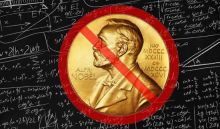
Gravitational waves, string theory, and modern physics
(Repeat) Celebrations are in order for the physicists who won the 2017 Nobel Prize, for the detection of gravitational waves. But the road to Stockholm was not easy. Unfolding over a century, it went from doubtful theory to daring experiments and even disrepute. 100 years is a major lag between a theory and its confirmation, and new ideas in physics may take even longer to prove.
Why it may be your great, great grandchildren who witness the confirmation of string theory. Plus, the exciting insights that gravitational waves provide into the phenomena of our universe, beginning with black holes.
And, physics has evolved - shouldn’t its rewards? A case for why the Nobel committee should honor collaborative groups rather than individuals, and the scientific breakthroughs it’s missed.
- Janna Levin – Physicist and astronomer at Barnard College at Columbia University, and the author of the story of LIGO, “Black Hole Blues and Other Songs from Outer Space.”
- Roland Pease – BBC reporter, producer, and host of “Science in Action.”
- David Gross – Theoretical physicist, string theorist, University of California, Santa Barbara, Kavli Institute for Theoretical Physics, winner, 2004 Nobel Prize in Physics.
Originally aired October 16, 2017
